Collaborative Mental Health Nursing Practice: Developing Therapeutic Relationships
VerifiedAdded on 2022/11/25
|11
|3085
|173
AI Summary
This study focuses on the development of collaborative mental health nursing practice with healthcare consumers experiencing psychological health illness. It highlights the importance of developing therapeutic relationships and gaining a living experience of the patient's mental illness. The study emphasizes the role of trust, empathy, and effective communication in providing quality care and improving the patient's overall health.
Contribute Materials
Your contribution can guide someone’s learning journey. Share your
documents today.
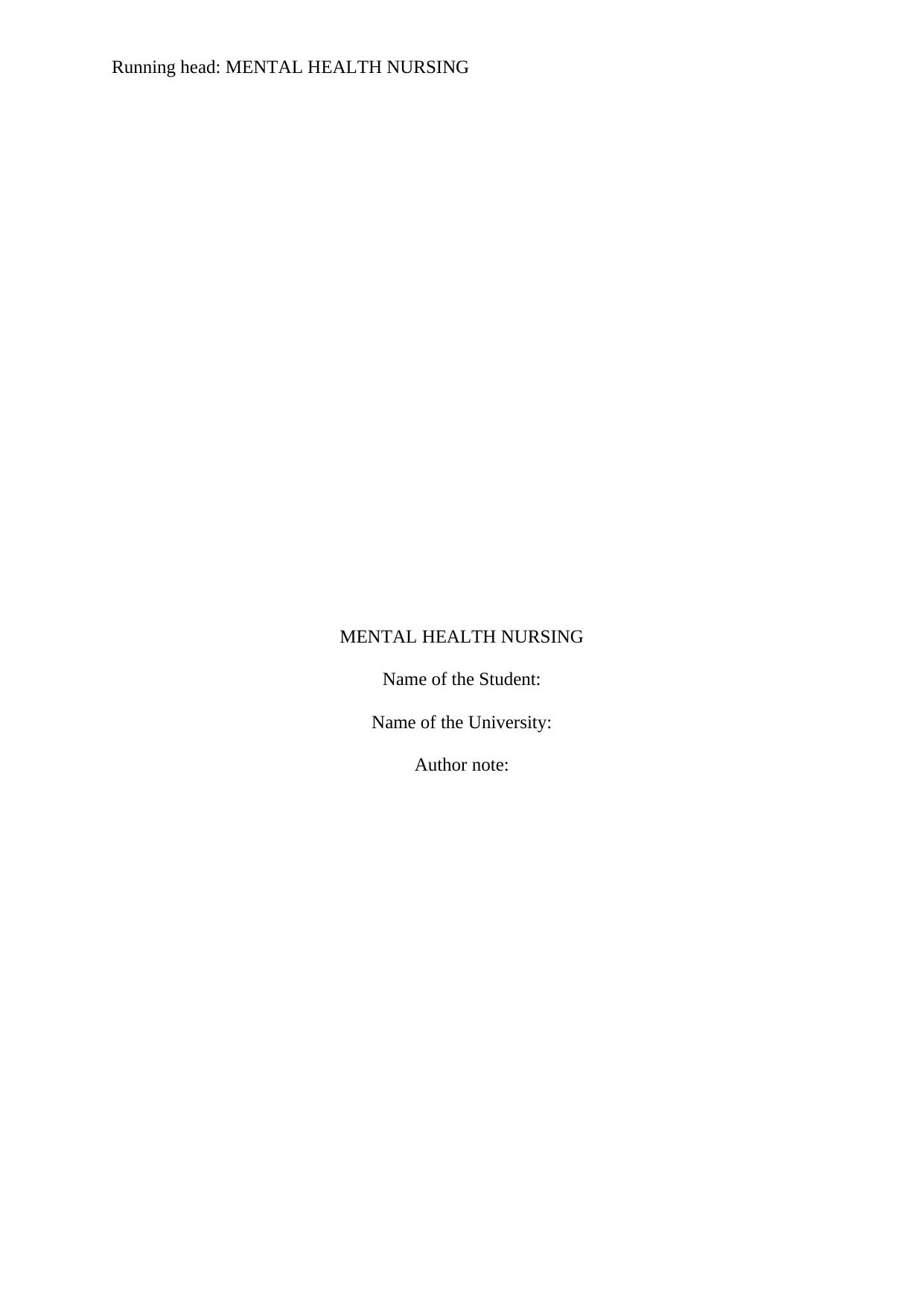
Running head: MENTAL HEALTH NURSING
MENTAL HEALTH NURSING
Name of the Student:
Name of the University:
Author note:
MENTAL HEALTH NURSING
Name of the Student:
Name of the University:
Author note:
Secure Best Marks with AI Grader
Need help grading? Try our AI Grader for instant feedback on your assignments.
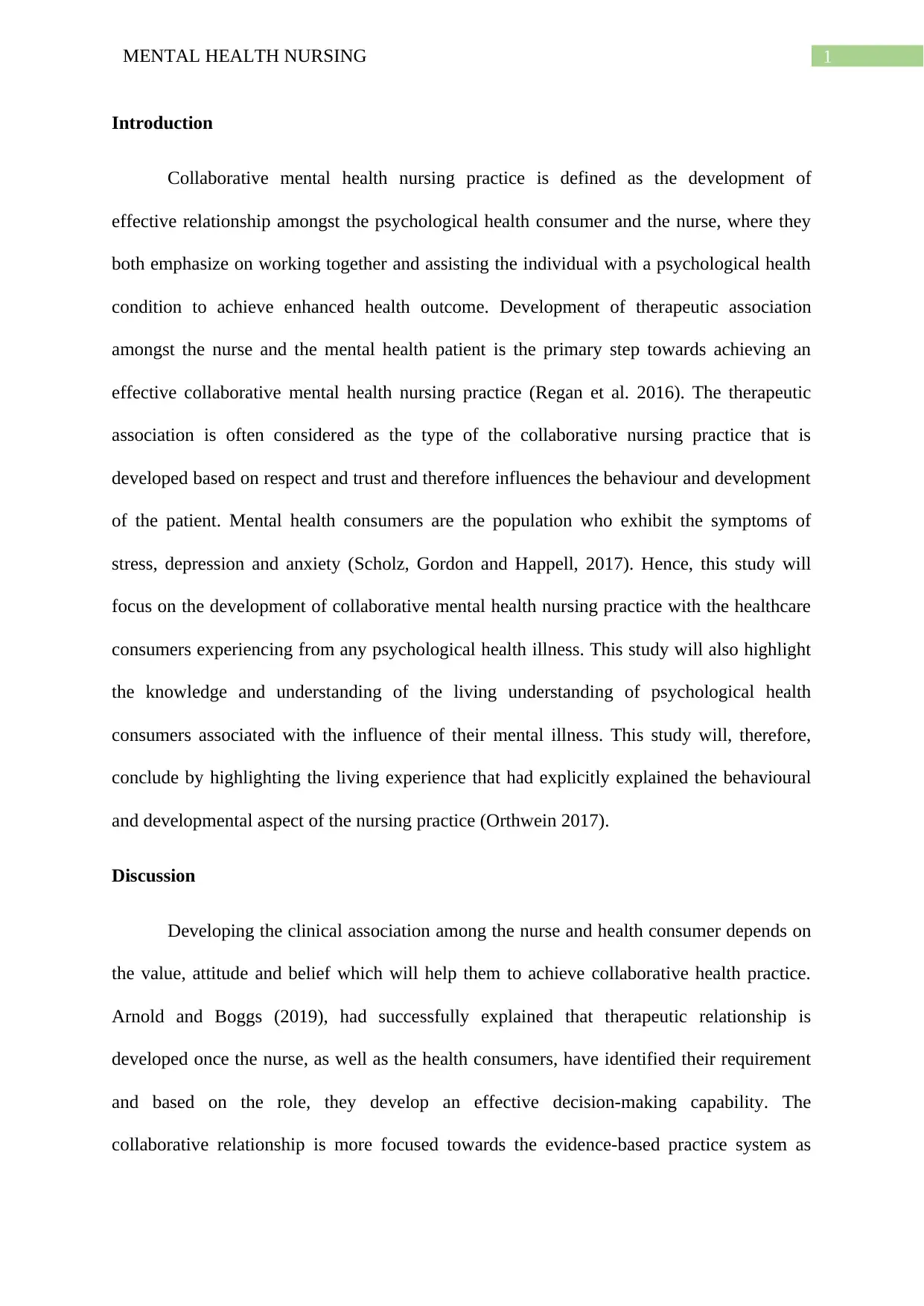
1MENTAL HEALTH NURSING
Introduction
Collaborative mental health nursing practice is defined as the development of
effective relationship amongst the psychological health consumer and the nurse, where they
both emphasize on working together and assisting the individual with a psychological health
condition to achieve enhanced health outcome. Development of therapeutic association
amongst the nurse and the mental health patient is the primary step towards achieving an
effective collaborative mental health nursing practice (Regan et al. 2016). The therapeutic
association is often considered as the type of the collaborative nursing practice that is
developed based on respect and trust and therefore influences the behaviour and development
of the patient. Mental health consumers are the population who exhibit the symptoms of
stress, depression and anxiety (Scholz, Gordon and Happell, 2017). Hence, this study will
focus on the development of collaborative mental health nursing practice with the healthcare
consumers experiencing from any psychological health illness. This study will also highlight
the knowledge and understanding of the living understanding of psychological health
consumers associated with the influence of their mental illness. This study will, therefore,
conclude by highlighting the living experience that had explicitly explained the behavioural
and developmental aspect of the nursing practice (Orthwein 2017).
Discussion
Developing the clinical association among the nurse and health consumer depends on
the value, attitude and belief which will help them to achieve collaborative health practice.
Arnold and Boggs (2019), had successfully explained that therapeutic relationship is
developed once the nurse, as well as the health consumers, have identified their requirement
and based on the role, they develop an effective decision-making capability. The
collaborative relationship is more focused towards the evidence-based practice system as
Introduction
Collaborative mental health nursing practice is defined as the development of
effective relationship amongst the psychological health consumer and the nurse, where they
both emphasize on working together and assisting the individual with a psychological health
condition to achieve enhanced health outcome. Development of therapeutic association
amongst the nurse and the mental health patient is the primary step towards achieving an
effective collaborative mental health nursing practice (Regan et al. 2016). The therapeutic
association is often considered as the type of the collaborative nursing practice that is
developed based on respect and trust and therefore influences the behaviour and development
of the patient. Mental health consumers are the population who exhibit the symptoms of
stress, depression and anxiety (Scholz, Gordon and Happell, 2017). Hence, this study will
focus on the development of collaborative mental health nursing practice with the healthcare
consumers experiencing from any psychological health illness. This study will also highlight
the knowledge and understanding of the living understanding of psychological health
consumers associated with the influence of their mental illness. This study will, therefore,
conclude by highlighting the living experience that had explicitly explained the behavioural
and developmental aspect of the nursing practice (Orthwein 2017).
Discussion
Developing the clinical association among the nurse and health consumer depends on
the value, attitude and belief which will help them to achieve collaborative health practice.
Arnold and Boggs (2019), had successfully explained that therapeutic relationship is
developed once the nurse, as well as the health consumers, have identified their requirement
and based on the role, they develop an effective decision-making capability. The
collaborative relationship is more focused towards the evidence-based practice system as
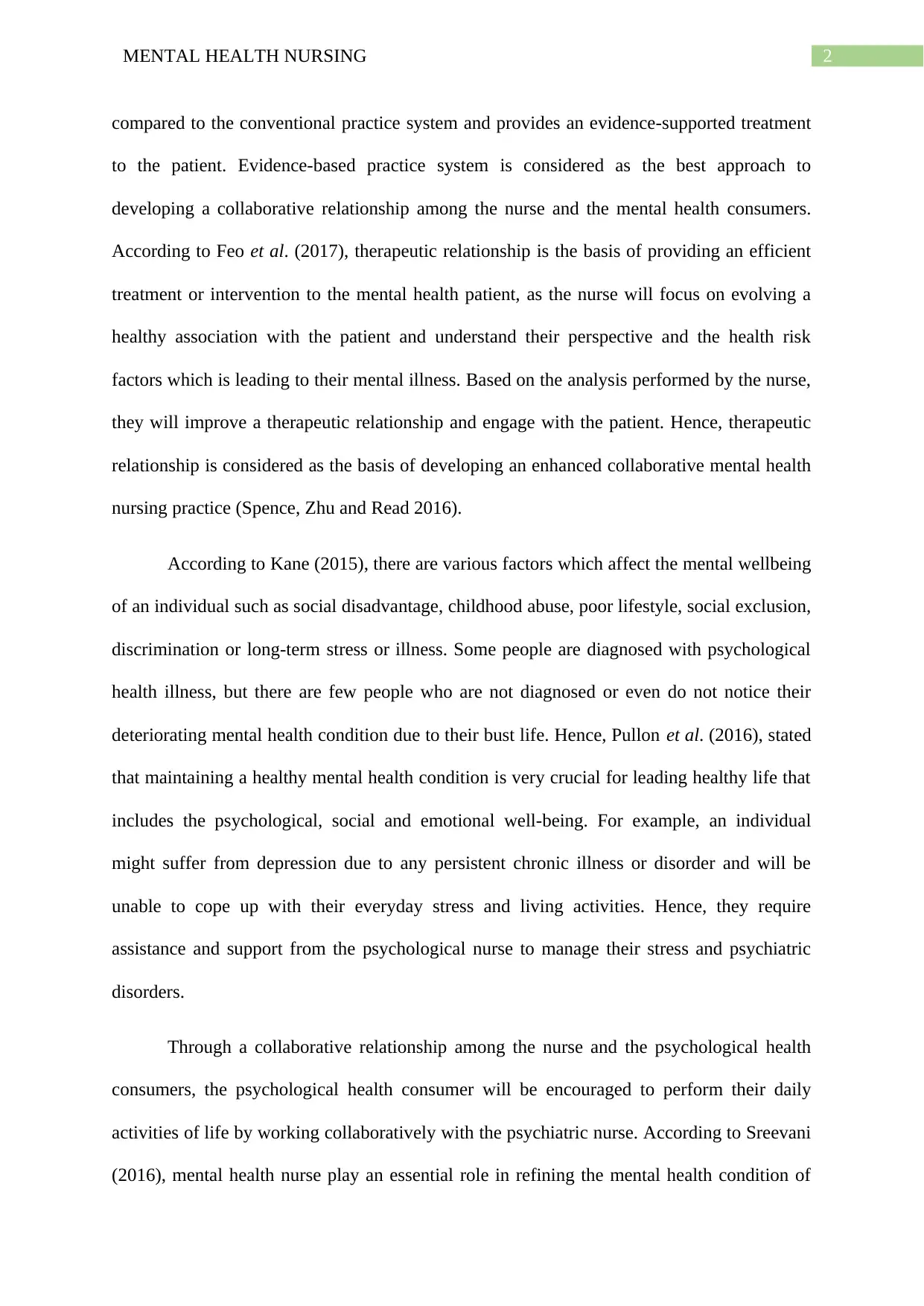
2MENTAL HEALTH NURSING
compared to the conventional practice system and provides an evidence-supported treatment
to the patient. Evidence-based practice system is considered as the best approach to
developing a collaborative relationship among the nurse and the mental health consumers.
According to Feo et al. (2017), therapeutic relationship is the basis of providing an efficient
treatment or intervention to the mental health patient, as the nurse will focus on evolving a
healthy association with the patient and understand their perspective and the health risk
factors which is leading to their mental illness. Based on the analysis performed by the nurse,
they will improve a therapeutic relationship and engage with the patient. Hence, therapeutic
relationship is considered as the basis of developing an enhanced collaborative mental health
nursing practice (Spence, Zhu and Read 2016).
According to Kane (2015), there are various factors which affect the mental wellbeing
of an individual such as social disadvantage, childhood abuse, poor lifestyle, social exclusion,
discrimination or long-term stress or illness. Some people are diagnosed with psychological
health illness, but there are few people who are not diagnosed or even do not notice their
deteriorating mental health condition due to their bust life. Hence, Pullon et al. (2016), stated
that maintaining a healthy mental health condition is very crucial for leading healthy life that
includes the psychological, social and emotional well-being. For example, an individual
might suffer from depression due to any persistent chronic illness or disorder and will be
unable to cope up with their everyday stress and living activities. Hence, they require
assistance and support from the psychological nurse to manage their stress and psychiatric
disorders.
Through a collaborative relationship among the nurse and the psychological health
consumers, the psychological health consumer will be encouraged to perform their daily
activities of life by working collaboratively with the psychiatric nurse. According to Sreevani
(2016), mental health nurse play an essential role in refining the mental health condition of
compared to the conventional practice system and provides an evidence-supported treatment
to the patient. Evidence-based practice system is considered as the best approach to
developing a collaborative relationship among the nurse and the mental health consumers.
According to Feo et al. (2017), therapeutic relationship is the basis of providing an efficient
treatment or intervention to the mental health patient, as the nurse will focus on evolving a
healthy association with the patient and understand their perspective and the health risk
factors which is leading to their mental illness. Based on the analysis performed by the nurse,
they will improve a therapeutic relationship and engage with the patient. Hence, therapeutic
relationship is considered as the basis of developing an enhanced collaborative mental health
nursing practice (Spence, Zhu and Read 2016).
According to Kane (2015), there are various factors which affect the mental wellbeing
of an individual such as social disadvantage, childhood abuse, poor lifestyle, social exclusion,
discrimination or long-term stress or illness. Some people are diagnosed with psychological
health illness, but there are few people who are not diagnosed or even do not notice their
deteriorating mental health condition due to their bust life. Hence, Pullon et al. (2016), stated
that maintaining a healthy mental health condition is very crucial for leading healthy life that
includes the psychological, social and emotional well-being. For example, an individual
might suffer from depression due to any persistent chronic illness or disorder and will be
unable to cope up with their everyday stress and living activities. Hence, they require
assistance and support from the psychological nurse to manage their stress and psychiatric
disorders.
Through a collaborative relationship among the nurse and the psychological health
consumers, the psychological health consumer will be encouraged to perform their daily
activities of life by working collaboratively with the psychiatric nurse. According to Sreevani
(2016), mental health nurse play an essential role in refining the mental health condition of
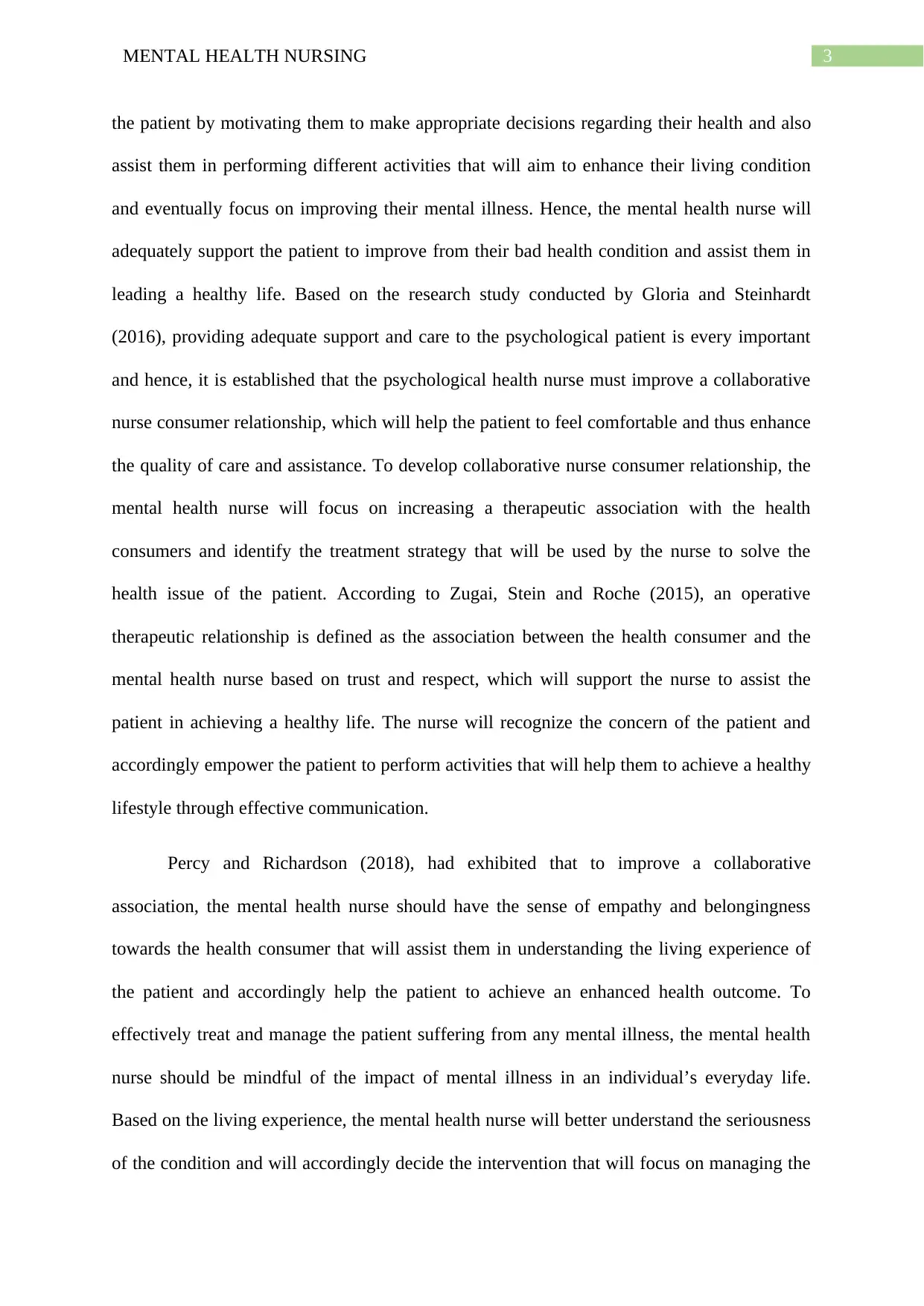
3MENTAL HEALTH NURSING
the patient by motivating them to make appropriate decisions regarding their health and also
assist them in performing different activities that will aim to enhance their living condition
and eventually focus on improving their mental illness. Hence, the mental health nurse will
adequately support the patient to improve from their bad health condition and assist them in
leading a healthy life. Based on the research study conducted by Gloria and Steinhardt
(2016), providing adequate support and care to the psychological patient is every important
and hence, it is established that the psychological health nurse must improve a collaborative
nurse consumer relationship, which will help the patient to feel comfortable and thus enhance
the quality of care and assistance. To develop collaborative nurse consumer relationship, the
mental health nurse will focus on increasing a therapeutic association with the health
consumers and identify the treatment strategy that will be used by the nurse to solve the
health issue of the patient. According to Zugai, Stein and Roche (2015), an operative
therapeutic relationship is defined as the association between the health consumer and the
mental health nurse based on trust and respect, which will support the nurse to assist the
patient in achieving a healthy life. The nurse will recognize the concern of the patient and
accordingly empower the patient to perform activities that will help them to achieve a healthy
lifestyle through effective communication.
Percy and Richardson (2018), had exhibited that to improve a collaborative
association, the mental health nurse should have the sense of empathy and belongingness
towards the health consumer that will assist them in understanding the living experience of
the patient and accordingly help the patient to achieve an enhanced health outcome. To
effectively treat and manage the patient suffering from any mental illness, the mental health
nurse should be mindful of the impact of mental illness in an individual’s everyday life.
Based on the living experience, the mental health nurse will better understand the seriousness
of the condition and will accordingly decide the intervention that will focus on managing the
the patient by motivating them to make appropriate decisions regarding their health and also
assist them in performing different activities that will aim to enhance their living condition
and eventually focus on improving their mental illness. Hence, the mental health nurse will
adequately support the patient to improve from their bad health condition and assist them in
leading a healthy life. Based on the research study conducted by Gloria and Steinhardt
(2016), providing adequate support and care to the psychological patient is every important
and hence, it is established that the psychological health nurse must improve a collaborative
nurse consumer relationship, which will help the patient to feel comfortable and thus enhance
the quality of care and assistance. To develop collaborative nurse consumer relationship, the
mental health nurse will focus on increasing a therapeutic association with the health
consumers and identify the treatment strategy that will be used by the nurse to solve the
health issue of the patient. According to Zugai, Stein and Roche (2015), an operative
therapeutic relationship is defined as the association between the health consumer and the
mental health nurse based on trust and respect, which will support the nurse to assist the
patient in achieving a healthy life. The nurse will recognize the concern of the patient and
accordingly empower the patient to perform activities that will help them to achieve a healthy
lifestyle through effective communication.
Percy and Richardson (2018), had exhibited that to improve a collaborative
association, the mental health nurse should have the sense of empathy and belongingness
towards the health consumer that will assist them in understanding the living experience of
the patient and accordingly help the patient to achieve an enhanced health outcome. To
effectively treat and manage the patient suffering from any mental illness, the mental health
nurse should be mindful of the impact of mental illness in an individual’s everyday life.
Based on the living experience, the mental health nurse will better understand the seriousness
of the condition and will accordingly decide the intervention that will focus on managing the
Secure Best Marks with AI Grader
Need help grading? Try our AI Grader for instant feedback on your assignments.
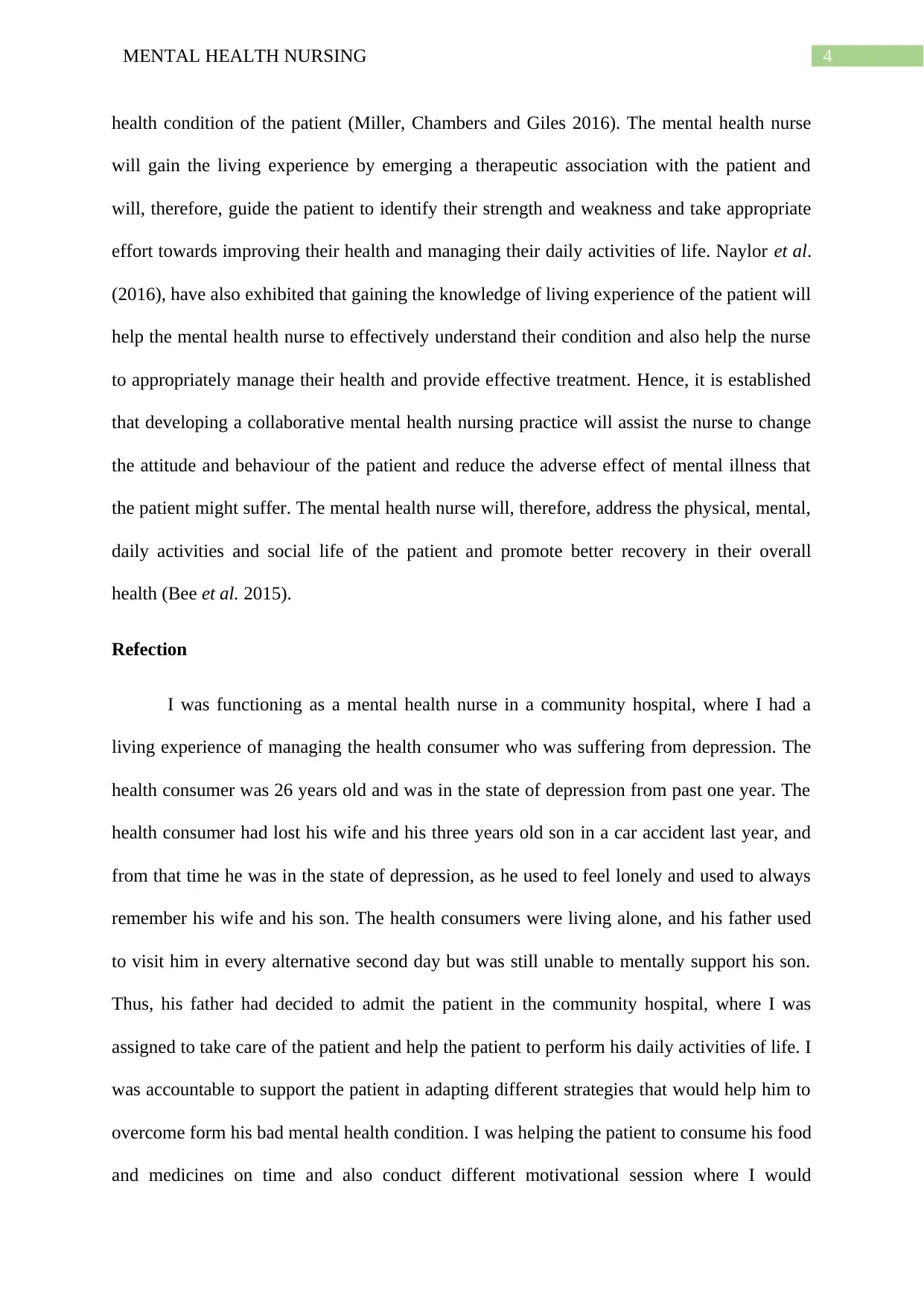
4MENTAL HEALTH NURSING
health condition of the patient (Miller, Chambers and Giles 2016). The mental health nurse
will gain the living experience by emerging a therapeutic association with the patient and
will, therefore, guide the patient to identify their strength and weakness and take appropriate
effort towards improving their health and managing their daily activities of life. Naylor et al.
(2016), have also exhibited that gaining the knowledge of living experience of the patient will
help the mental health nurse to effectively understand their condition and also help the nurse
to appropriately manage their health and provide effective treatment. Hence, it is established
that developing a collaborative mental health nursing practice will assist the nurse to change
the attitude and behaviour of the patient and reduce the adverse effect of mental illness that
the patient might suffer. The mental health nurse will, therefore, address the physical, mental,
daily activities and social life of the patient and promote better recovery in their overall
health (Bee et al. 2015).
Refection
I was functioning as a mental health nurse in a community hospital, where I had a
living experience of managing the health consumer who was suffering from depression. The
health consumer was 26 years old and was in the state of depression from past one year. The
health consumer had lost his wife and his three years old son in a car accident last year, and
from that time he was in the state of depression, as he used to feel lonely and used to always
remember his wife and his son. The health consumers were living alone, and his father used
to visit him in every alternative second day but was still unable to mentally support his son.
Thus, his father had decided to admit the patient in the community hospital, where I was
assigned to take care of the patient and help the patient to perform his daily activities of life. I
was accountable to support the patient in adapting different strategies that would help him to
overcome form his bad mental health condition. I was helping the patient to consume his food
and medicines on time and also conduct different motivational session where I would
health condition of the patient (Miller, Chambers and Giles 2016). The mental health nurse
will gain the living experience by emerging a therapeutic association with the patient and
will, therefore, guide the patient to identify their strength and weakness and take appropriate
effort towards improving their health and managing their daily activities of life. Naylor et al.
(2016), have also exhibited that gaining the knowledge of living experience of the patient will
help the mental health nurse to effectively understand their condition and also help the nurse
to appropriately manage their health and provide effective treatment. Hence, it is established
that developing a collaborative mental health nursing practice will assist the nurse to change
the attitude and behaviour of the patient and reduce the adverse effect of mental illness that
the patient might suffer. The mental health nurse will, therefore, address the physical, mental,
daily activities and social life of the patient and promote better recovery in their overall
health (Bee et al. 2015).
Refection
I was functioning as a mental health nurse in a community hospital, where I had a
living experience of managing the health consumer who was suffering from depression. The
health consumer was 26 years old and was in the state of depression from past one year. The
health consumer had lost his wife and his three years old son in a car accident last year, and
from that time he was in the state of depression, as he used to feel lonely and used to always
remember his wife and his son. The health consumers were living alone, and his father used
to visit him in every alternative second day but was still unable to mentally support his son.
Thus, his father had decided to admit the patient in the community hospital, where I was
assigned to take care of the patient and help the patient to perform his daily activities of life. I
was accountable to support the patient in adapting different strategies that would help him to
overcome form his bad mental health condition. I was helping the patient to consume his food
and medicines on time and also conduct different motivational session where I would
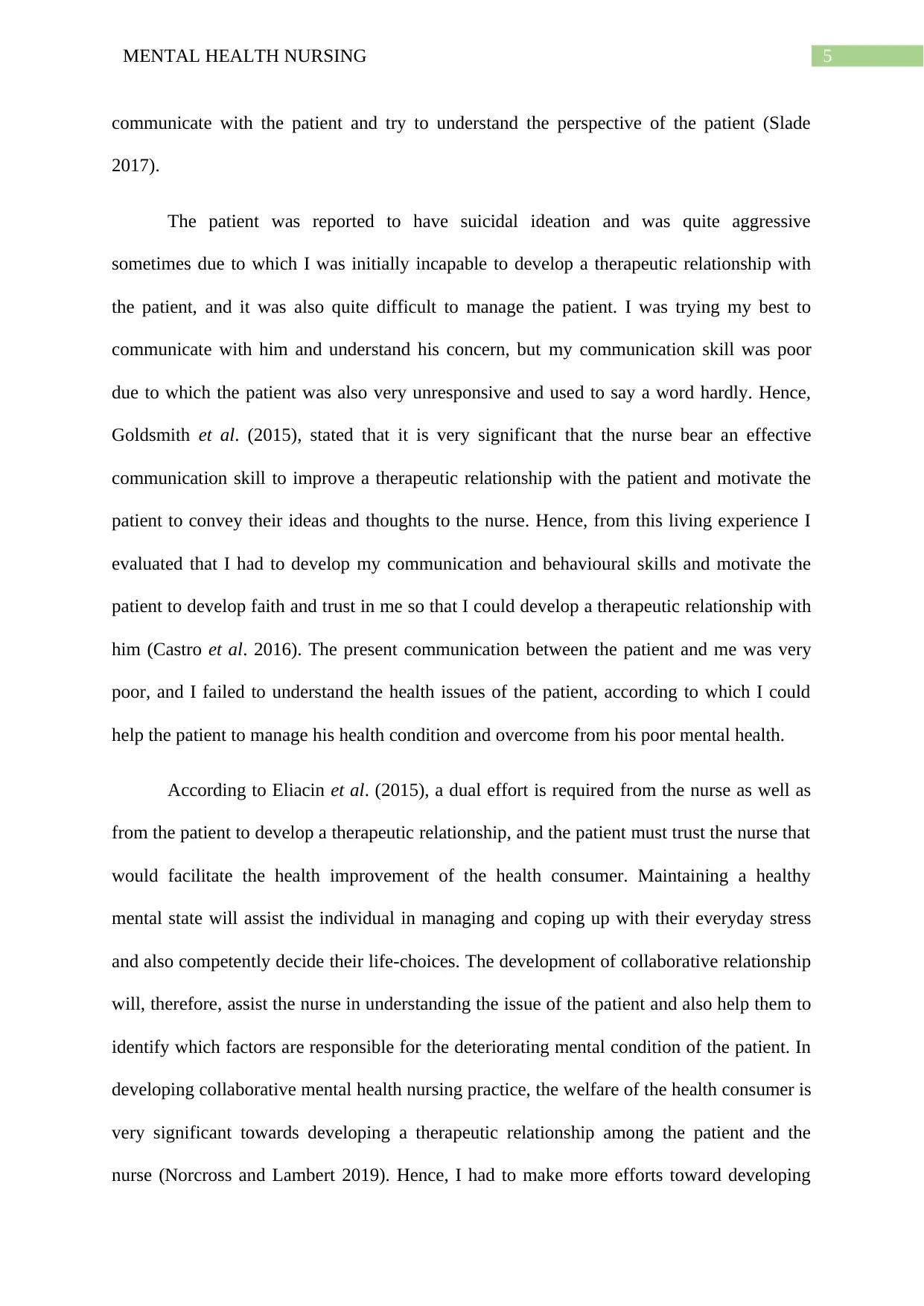
5MENTAL HEALTH NURSING
communicate with the patient and try to understand the perspective of the patient (Slade
2017).
The patient was reported to have suicidal ideation and was quite aggressive
sometimes due to which I was initially incapable to develop a therapeutic relationship with
the patient, and it was also quite difficult to manage the patient. I was trying my best to
communicate with him and understand his concern, but my communication skill was poor
due to which the patient was also very unresponsive and used to say a word hardly. Hence,
Goldsmith et al. (2015), stated that it is very significant that the nurse bear an effective
communication skill to improve a therapeutic relationship with the patient and motivate the
patient to convey their ideas and thoughts to the nurse. Hence, from this living experience I
evaluated that I had to develop my communication and behavioural skills and motivate the
patient to develop faith and trust in me so that I could develop a therapeutic relationship with
him (Castro et al. 2016). The present communication between the patient and me was very
poor, and I failed to understand the health issues of the patient, according to which I could
help the patient to manage his health condition and overcome from his poor mental health.
According to Eliacin et al. (2015), a dual effort is required from the nurse as well as
from the patient to develop a therapeutic relationship, and the patient must trust the nurse that
would facilitate the health improvement of the health consumer. Maintaining a healthy
mental state will assist the individual in managing and coping up with their everyday stress
and also competently decide their life-choices. The development of collaborative relationship
will, therefore, assist the nurse in understanding the issue of the patient and also help them to
identify which factors are responsible for the deteriorating mental condition of the patient. In
developing collaborative mental health nursing practice, the welfare of the health consumer is
very significant towards developing a therapeutic relationship among the patient and the
nurse (Norcross and Lambert 2019). Hence, I had to make more efforts toward developing
communicate with the patient and try to understand the perspective of the patient (Slade
2017).
The patient was reported to have suicidal ideation and was quite aggressive
sometimes due to which I was initially incapable to develop a therapeutic relationship with
the patient, and it was also quite difficult to manage the patient. I was trying my best to
communicate with him and understand his concern, but my communication skill was poor
due to which the patient was also very unresponsive and used to say a word hardly. Hence,
Goldsmith et al. (2015), stated that it is very significant that the nurse bear an effective
communication skill to improve a therapeutic relationship with the patient and motivate the
patient to convey their ideas and thoughts to the nurse. Hence, from this living experience I
evaluated that I had to develop my communication and behavioural skills and motivate the
patient to develop faith and trust in me so that I could develop a therapeutic relationship with
him (Castro et al. 2016). The present communication between the patient and me was very
poor, and I failed to understand the health issues of the patient, according to which I could
help the patient to manage his health condition and overcome from his poor mental health.
According to Eliacin et al. (2015), a dual effort is required from the nurse as well as
from the patient to develop a therapeutic relationship, and the patient must trust the nurse that
would facilitate the health improvement of the health consumer. Maintaining a healthy
mental state will assist the individual in managing and coping up with their everyday stress
and also competently decide their life-choices. The development of collaborative relationship
will, therefore, assist the nurse in understanding the issue of the patient and also help them to
identify which factors are responsible for the deteriorating mental condition of the patient. In
developing collaborative mental health nursing practice, the welfare of the health consumer is
very significant towards developing a therapeutic relationship among the patient and the
nurse (Norcross and Lambert 2019). Hence, I had to make more efforts toward developing
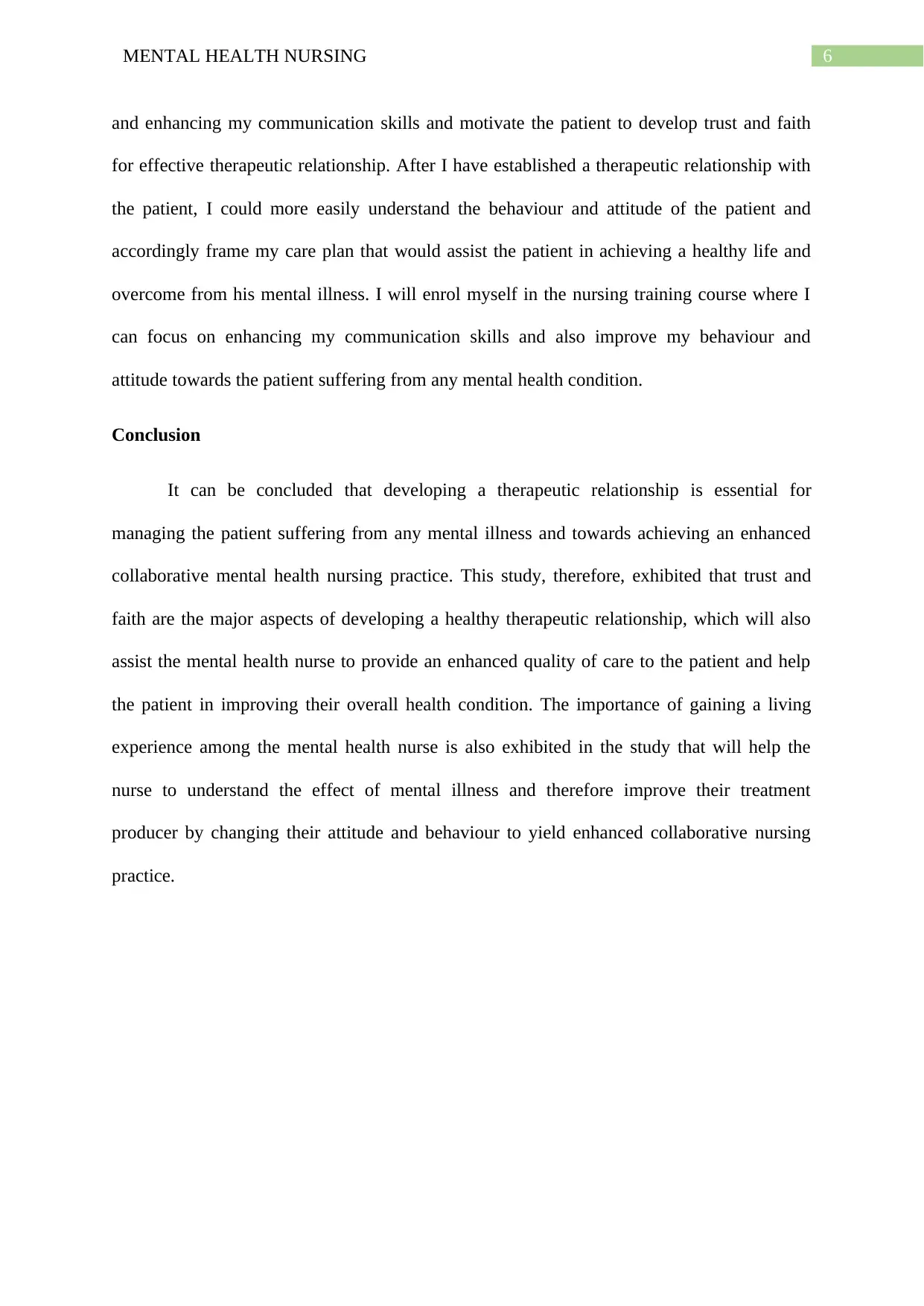
6MENTAL HEALTH NURSING
and enhancing my communication skills and motivate the patient to develop trust and faith
for effective therapeutic relationship. After I have established a therapeutic relationship with
the patient, I could more easily understand the behaviour and attitude of the patient and
accordingly frame my care plan that would assist the patient in achieving a healthy life and
overcome from his mental illness. I will enrol myself in the nursing training course where I
can focus on enhancing my communication skills and also improve my behaviour and
attitude towards the patient suffering from any mental health condition.
Conclusion
It can be concluded that developing a therapeutic relationship is essential for
managing the patient suffering from any mental illness and towards achieving an enhanced
collaborative mental health nursing practice. This study, therefore, exhibited that trust and
faith are the major aspects of developing a healthy therapeutic relationship, which will also
assist the mental health nurse to provide an enhanced quality of care to the patient and help
the patient in improving their overall health condition. The importance of gaining a living
experience among the mental health nurse is also exhibited in the study that will help the
nurse to understand the effect of mental illness and therefore improve their treatment
producer by changing their attitude and behaviour to yield enhanced collaborative nursing
practice.
and enhancing my communication skills and motivate the patient to develop trust and faith
for effective therapeutic relationship. After I have established a therapeutic relationship with
the patient, I could more easily understand the behaviour and attitude of the patient and
accordingly frame my care plan that would assist the patient in achieving a healthy life and
overcome from his mental illness. I will enrol myself in the nursing training course where I
can focus on enhancing my communication skills and also improve my behaviour and
attitude towards the patient suffering from any mental health condition.
Conclusion
It can be concluded that developing a therapeutic relationship is essential for
managing the patient suffering from any mental illness and towards achieving an enhanced
collaborative mental health nursing practice. This study, therefore, exhibited that trust and
faith are the major aspects of developing a healthy therapeutic relationship, which will also
assist the mental health nurse to provide an enhanced quality of care to the patient and help
the patient in improving their overall health condition. The importance of gaining a living
experience among the mental health nurse is also exhibited in the study that will help the
nurse to understand the effect of mental illness and therefore improve their treatment
producer by changing their attitude and behaviour to yield enhanced collaborative nursing
practice.
Paraphrase This Document
Need a fresh take? Get an instant paraphrase of this document with our AI Paraphraser
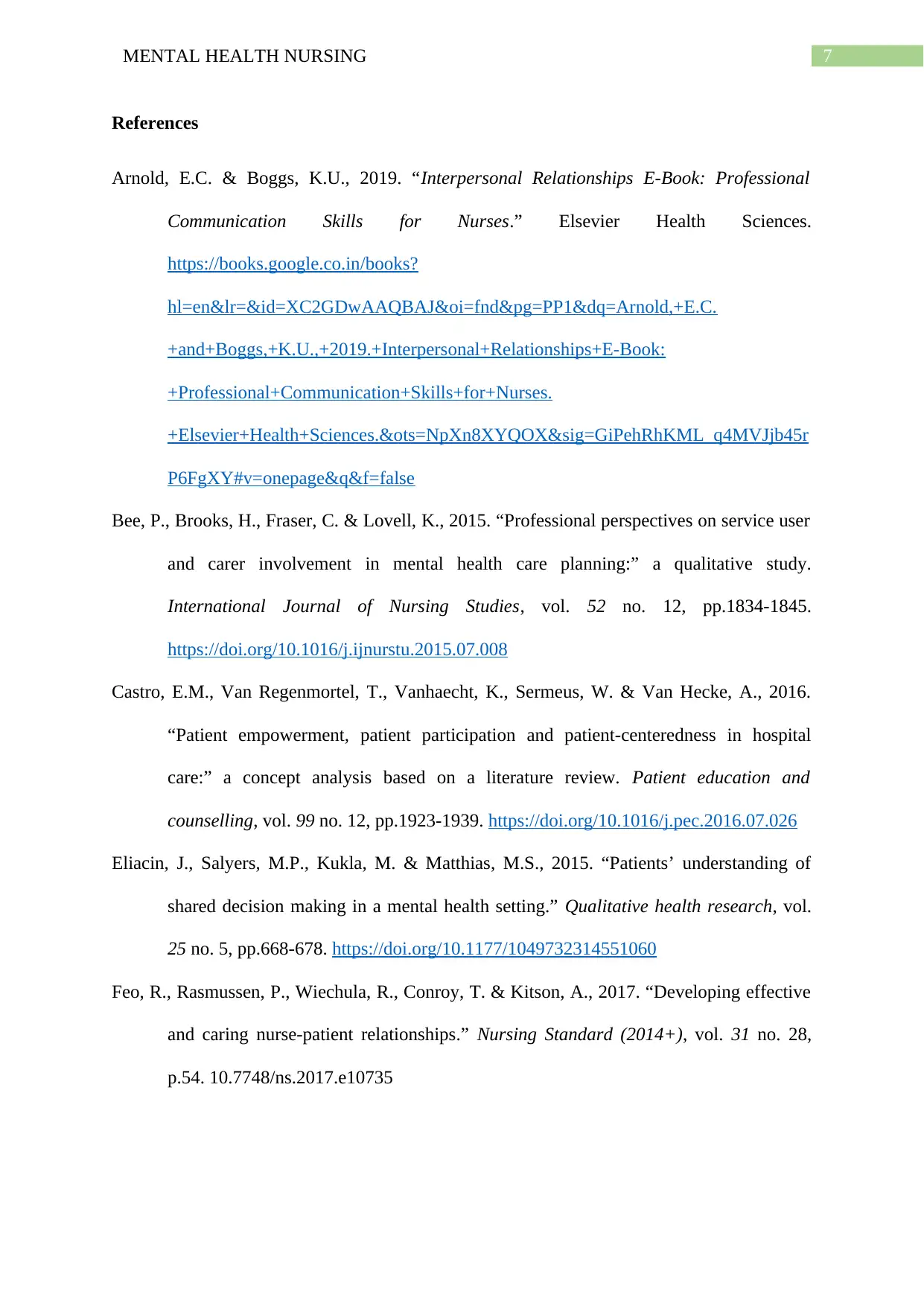
7MENTAL HEALTH NURSING
References
Arnold, E.C. & Boggs, K.U., 2019. “Interpersonal Relationships E-Book: Professional
Communication Skills for Nurses.” Elsevier Health Sciences.
https://books.google.co.in/books?
hl=en&lr=&id=XC2GDwAAQBAJ&oi=fnd&pg=PP1&dq=Arnold,+E.C.
+and+Boggs,+K.U.,+2019.+Interpersonal+Relationships+E-Book:
+Professional+Communication+Skills+for+Nurses.
+Elsevier+Health+Sciences.&ots=NpXn8XYQOX&sig=GiPehRhKML_q4MVJjb45r
P6FgXY#v=onepage&q&f=false
Bee, P., Brooks, H., Fraser, C. & Lovell, K., 2015. “Professional perspectives on service user
and carer involvement in mental health care planning:” a qualitative study.
International Journal of Nursing Studies, vol. 52 no. 12, pp.1834-1845.
https://doi.org/10.1016/j.ijnurstu.2015.07.008
Castro, E.M., Van Regenmortel, T., Vanhaecht, K., Sermeus, W. & Van Hecke, A., 2016.
“Patient empowerment, patient participation and patient-centeredness in hospital
care:” a concept analysis based on a literature review. Patient education and
counselling, vol. 99 no. 12, pp.1923-1939. https://doi.org/10.1016/j.pec.2016.07.026
Eliacin, J., Salyers, M.P., Kukla, M. & Matthias, M.S., 2015. “Patients’ understanding of
shared decision making in a mental health setting.” Qualitative health research, vol.
25 no. 5, pp.668-678. https://doi.org/10.1177/1049732314551060
Feo, R., Rasmussen, P., Wiechula, R., Conroy, T. & Kitson, A., 2017. “Developing effective
and caring nurse-patient relationships.” Nursing Standard (2014+), vol. 31 no. 28,
p.54. 10.7748/ns.2017.e10735
References
Arnold, E.C. & Boggs, K.U., 2019. “Interpersonal Relationships E-Book: Professional
Communication Skills for Nurses.” Elsevier Health Sciences.
https://books.google.co.in/books?
hl=en&lr=&id=XC2GDwAAQBAJ&oi=fnd&pg=PP1&dq=Arnold,+E.C.
+and+Boggs,+K.U.,+2019.+Interpersonal+Relationships+E-Book:
+Professional+Communication+Skills+for+Nurses.
+Elsevier+Health+Sciences.&ots=NpXn8XYQOX&sig=GiPehRhKML_q4MVJjb45r
P6FgXY#v=onepage&q&f=false
Bee, P., Brooks, H., Fraser, C. & Lovell, K., 2015. “Professional perspectives on service user
and carer involvement in mental health care planning:” a qualitative study.
International Journal of Nursing Studies, vol. 52 no. 12, pp.1834-1845.
https://doi.org/10.1016/j.ijnurstu.2015.07.008
Castro, E.M., Van Regenmortel, T., Vanhaecht, K., Sermeus, W. & Van Hecke, A., 2016.
“Patient empowerment, patient participation and patient-centeredness in hospital
care:” a concept analysis based on a literature review. Patient education and
counselling, vol. 99 no. 12, pp.1923-1939. https://doi.org/10.1016/j.pec.2016.07.026
Eliacin, J., Salyers, M.P., Kukla, M. & Matthias, M.S., 2015. “Patients’ understanding of
shared decision making in a mental health setting.” Qualitative health research, vol.
25 no. 5, pp.668-678. https://doi.org/10.1177/1049732314551060
Feo, R., Rasmussen, P., Wiechula, R., Conroy, T. & Kitson, A., 2017. “Developing effective
and caring nurse-patient relationships.” Nursing Standard (2014+), vol. 31 no. 28,
p.54. 10.7748/ns.2017.e10735
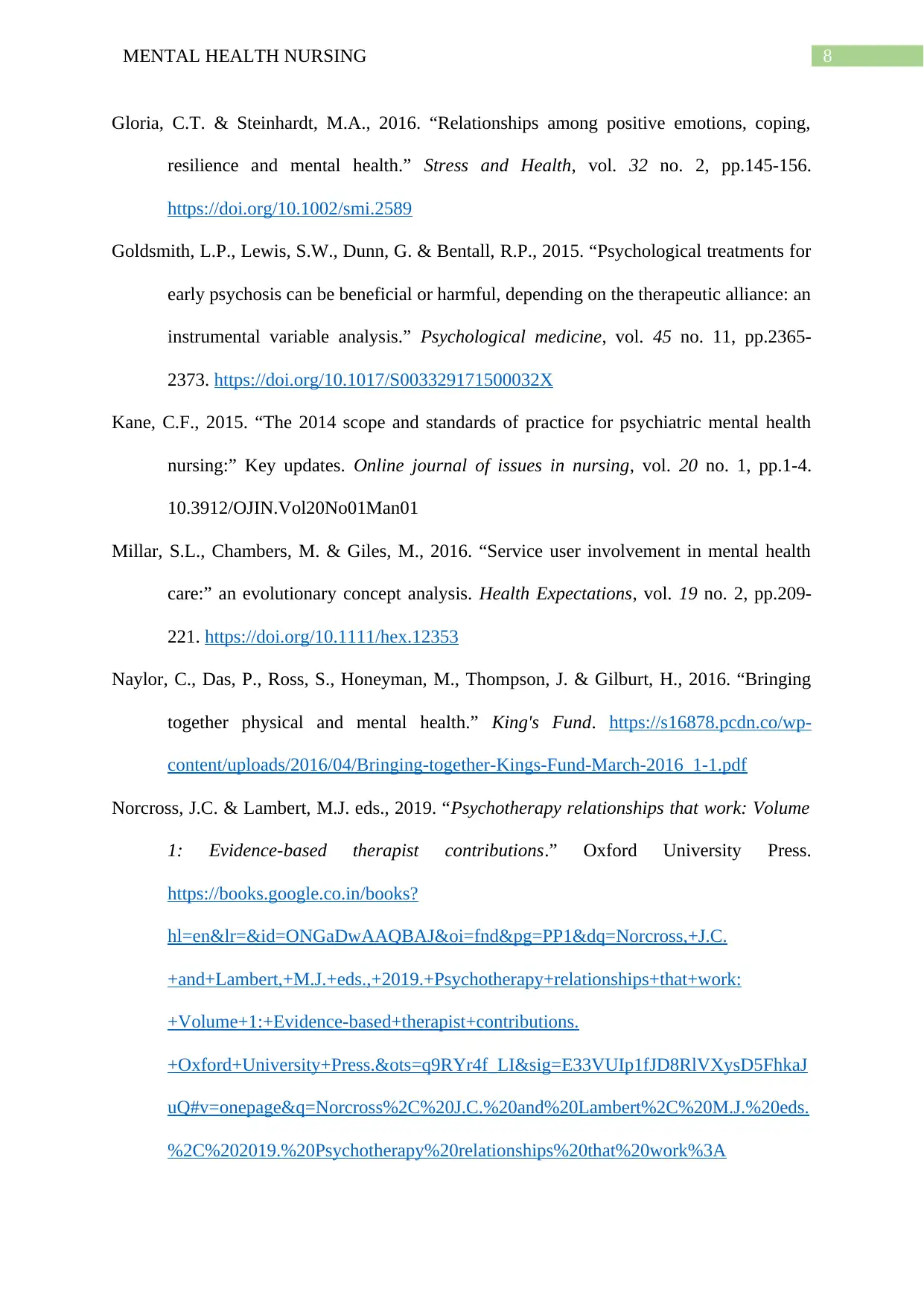
8MENTAL HEALTH NURSING
Gloria, C.T. & Steinhardt, M.A., 2016. “Relationships among positive emotions, coping,
resilience and mental health.” Stress and Health, vol. 32 no. 2, pp.145-156.
https://doi.org/10.1002/smi.2589
Goldsmith, L.P., Lewis, S.W., Dunn, G. & Bentall, R.P., 2015. “Psychological treatments for
early psychosis can be beneficial or harmful, depending on the therapeutic alliance: an
instrumental variable analysis.” Psychological medicine, vol. 45 no. 11, pp.2365-
2373. https://doi.org/10.1017/S003329171500032X
Kane, C.F., 2015. “The 2014 scope and standards of practice for psychiatric mental health
nursing:” Key updates. Online journal of issues in nursing, vol. 20 no. 1, pp.1-4.
10.3912/OJIN.Vol20No01Man01
Millar, S.L., Chambers, M. & Giles, M., 2016. “Service user involvement in mental health
care:” an evolutionary concept analysis. Health Expectations, vol. 19 no. 2, pp.209-
221. https://doi.org/10.1111/hex.12353
Naylor, C., Das, P., Ross, S., Honeyman, M., Thompson, J. & Gilburt, H., 2016. “Bringing
together physical and mental health.” King's Fund. https://s16878.pcdn.co/wp-
content/uploads/2016/04/Bringing-together-Kings-Fund-March-2016_1-1.pdf
Norcross, J.C. & Lambert, M.J. eds., 2019. “Psychotherapy relationships that work: Volume
1: Evidence-based therapist contributions.” Oxford University Press.
https://books.google.co.in/books?
hl=en&lr=&id=ONGaDwAAQBAJ&oi=fnd&pg=PP1&dq=Norcross,+J.C.
+and+Lambert,+M.J.+eds.,+2019.+Psychotherapy+relationships+that+work:
+Volume+1:+Evidence-based+therapist+contributions.
+Oxford+University+Press.&ots=q9RYr4f_LI&sig=E33VUIp1fJD8RlVXysD5FhkaJ
uQ#v=onepage&q=Norcross%2C%20J.C.%20and%20Lambert%2C%20M.J.%20eds.
%2C%202019.%20Psychotherapy%20relationships%20that%20work%3A
Gloria, C.T. & Steinhardt, M.A., 2016. “Relationships among positive emotions, coping,
resilience and mental health.” Stress and Health, vol. 32 no. 2, pp.145-156.
https://doi.org/10.1002/smi.2589
Goldsmith, L.P., Lewis, S.W., Dunn, G. & Bentall, R.P., 2015. “Psychological treatments for
early psychosis can be beneficial or harmful, depending on the therapeutic alliance: an
instrumental variable analysis.” Psychological medicine, vol. 45 no. 11, pp.2365-
2373. https://doi.org/10.1017/S003329171500032X
Kane, C.F., 2015. “The 2014 scope and standards of practice for psychiatric mental health
nursing:” Key updates. Online journal of issues in nursing, vol. 20 no. 1, pp.1-4.
10.3912/OJIN.Vol20No01Man01
Millar, S.L., Chambers, M. & Giles, M., 2016. “Service user involvement in mental health
care:” an evolutionary concept analysis. Health Expectations, vol. 19 no. 2, pp.209-
221. https://doi.org/10.1111/hex.12353
Naylor, C., Das, P., Ross, S., Honeyman, M., Thompson, J. & Gilburt, H., 2016. “Bringing
together physical and mental health.” King's Fund. https://s16878.pcdn.co/wp-
content/uploads/2016/04/Bringing-together-Kings-Fund-March-2016_1-1.pdf
Norcross, J.C. & Lambert, M.J. eds., 2019. “Psychotherapy relationships that work: Volume
1: Evidence-based therapist contributions.” Oxford University Press.
https://books.google.co.in/books?
hl=en&lr=&id=ONGaDwAAQBAJ&oi=fnd&pg=PP1&dq=Norcross,+J.C.
+and+Lambert,+M.J.+eds.,+2019.+Psychotherapy+relationships+that+work:
+Volume+1:+Evidence-based+therapist+contributions.
+Oxford+University+Press.&ots=q9RYr4f_LI&sig=E33VUIp1fJD8RlVXysD5FhkaJ
uQ#v=onepage&q=Norcross%2C%20J.C.%20and%20Lambert%2C%20M.J.%20eds.
%2C%202019.%20Psychotherapy%20relationships%20that%20work%3A
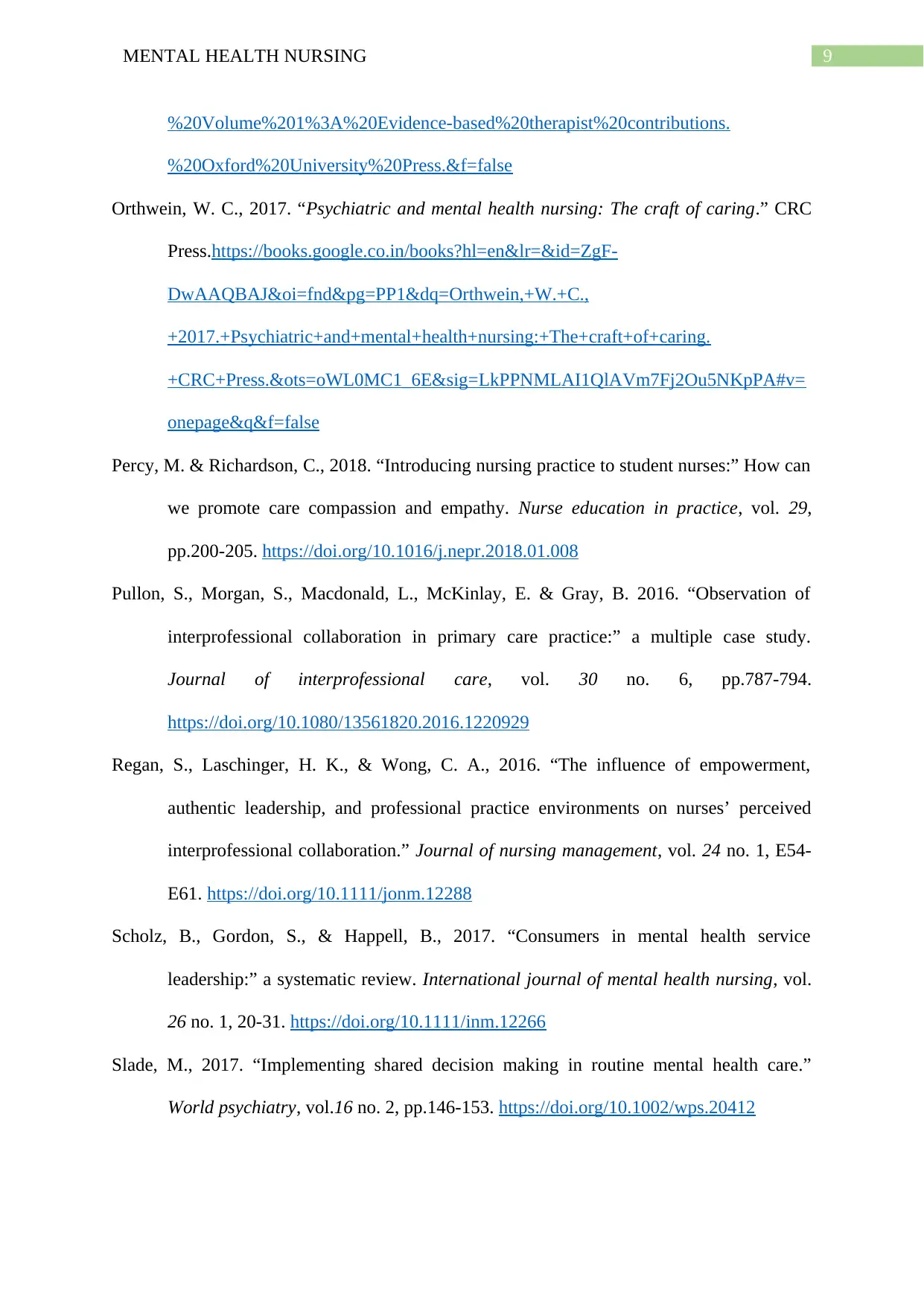
9MENTAL HEALTH NURSING
%20Volume%201%3A%20Evidence-based%20therapist%20contributions.
%20Oxford%20University%20Press.&f=false
Orthwein, W. C., 2017. “Psychiatric and mental health nursing: The craft of caring.” CRC
Press.https://books.google.co.in/books?hl=en&lr=&id=ZgF-
DwAAQBAJ&oi=fnd&pg=PP1&dq=Orthwein,+W.+C.,
+2017.+Psychiatric+and+mental+health+nursing:+The+craft+of+caring.
+CRC+Press.&ots=oWL0MC1_6E&sig=LkPPNMLAI1QlAVm7Fj2Ou5NKpPA#v=
onepage&q&f=false
Percy, M. & Richardson, C., 2018. “Introducing nursing practice to student nurses:” How can
we promote care compassion and empathy. Nurse education in practice, vol. 29,
pp.200-205. https://doi.org/10.1016/j.nepr.2018.01.008
Pullon, S., Morgan, S., Macdonald, L., McKinlay, E. & Gray, B. 2016. “Observation of
interprofessional collaboration in primary care practice:” a multiple case study.
Journal of interprofessional care, vol. 30 no. 6, pp.787-794.
https://doi.org/10.1080/13561820.2016.1220929
Regan, S., Laschinger, H. K., & Wong, C. A., 2016. “The influence of empowerment,
authentic leadership, and professional practice environments on nurses’ perceived
interprofessional collaboration.” Journal of nursing management, vol. 24 no. 1, E54-
E61. https://doi.org/10.1111/jonm.12288
Scholz, B., Gordon, S., & Happell, B., 2017. “Consumers in mental health service
leadership:” a systematic review. International journal of mental health nursing, vol.
26 no. 1, 20-31. https://doi.org/10.1111/inm.12266
Slade, M., 2017. “Implementing shared decision making in routine mental health care.”
World psychiatry, vol.16 no. 2, pp.146-153. https://doi.org/10.1002/wps.20412
%20Volume%201%3A%20Evidence-based%20therapist%20contributions.
%20Oxford%20University%20Press.&f=false
Orthwein, W. C., 2017. “Psychiatric and mental health nursing: The craft of caring.” CRC
Press.https://books.google.co.in/books?hl=en&lr=&id=ZgF-
DwAAQBAJ&oi=fnd&pg=PP1&dq=Orthwein,+W.+C.,
+2017.+Psychiatric+and+mental+health+nursing:+The+craft+of+caring.
+CRC+Press.&ots=oWL0MC1_6E&sig=LkPPNMLAI1QlAVm7Fj2Ou5NKpPA#v=
onepage&q&f=false
Percy, M. & Richardson, C., 2018. “Introducing nursing practice to student nurses:” How can
we promote care compassion and empathy. Nurse education in practice, vol. 29,
pp.200-205. https://doi.org/10.1016/j.nepr.2018.01.008
Pullon, S., Morgan, S., Macdonald, L., McKinlay, E. & Gray, B. 2016. “Observation of
interprofessional collaboration in primary care practice:” a multiple case study.
Journal of interprofessional care, vol. 30 no. 6, pp.787-794.
https://doi.org/10.1080/13561820.2016.1220929
Regan, S., Laschinger, H. K., & Wong, C. A., 2016. “The influence of empowerment,
authentic leadership, and professional practice environments on nurses’ perceived
interprofessional collaboration.” Journal of nursing management, vol. 24 no. 1, E54-
E61. https://doi.org/10.1111/jonm.12288
Scholz, B., Gordon, S., & Happell, B., 2017. “Consumers in mental health service
leadership:” a systematic review. International journal of mental health nursing, vol.
26 no. 1, 20-31. https://doi.org/10.1111/inm.12266
Slade, M., 2017. “Implementing shared decision making in routine mental health care.”
World psychiatry, vol.16 no. 2, pp.146-153. https://doi.org/10.1002/wps.20412
Secure Best Marks with AI Grader
Need help grading? Try our AI Grader for instant feedback on your assignments.
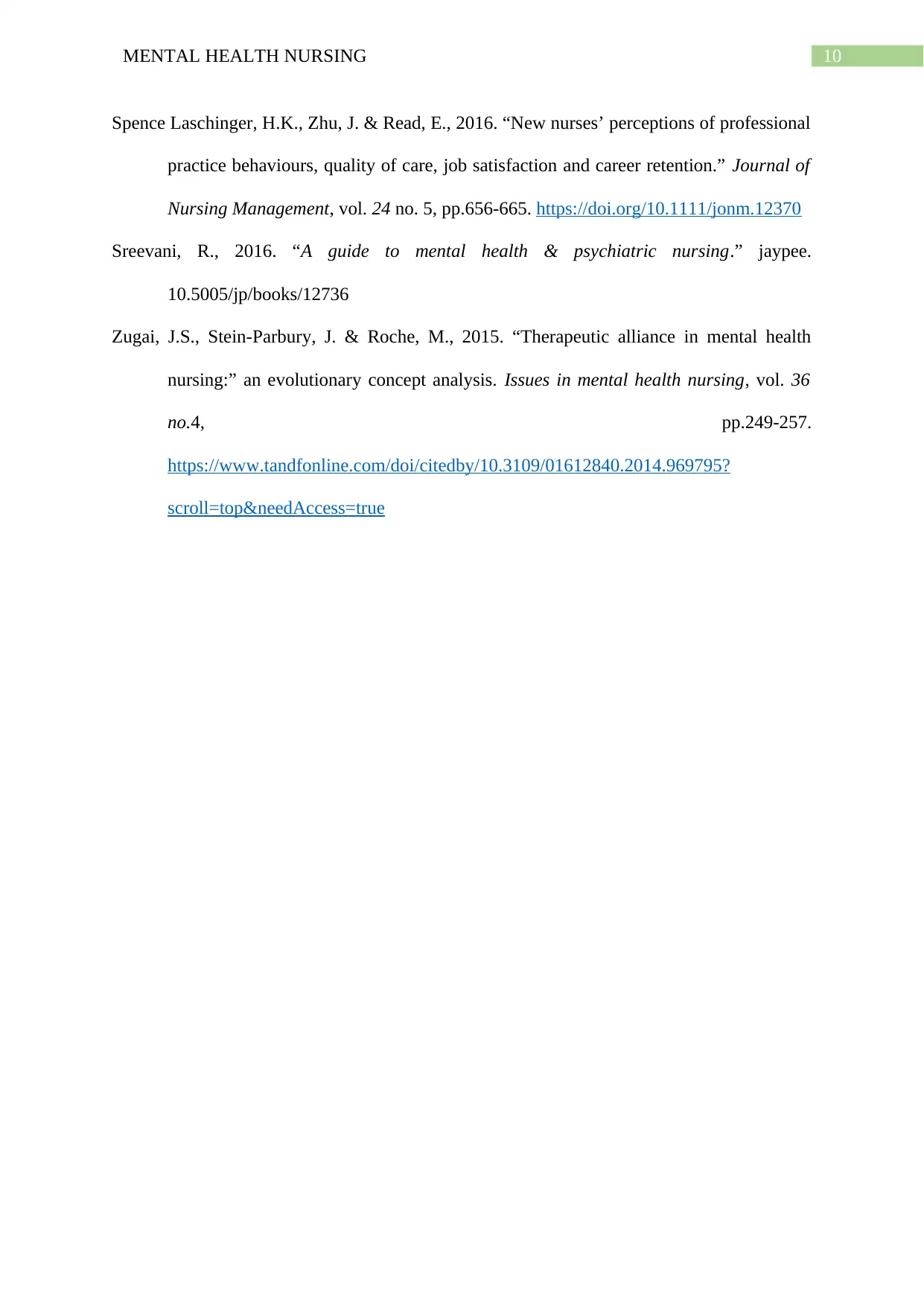
10MENTAL HEALTH NURSING
Spence Laschinger, H.K., Zhu, J. & Read, E., 2016. “New nurses’ perceptions of professional
practice behaviours, quality of care, job satisfaction and career retention.” Journal of
Nursing Management, vol. 24 no. 5, pp.656-665. https://doi.org/10.1111/jonm.12370
Sreevani, R., 2016. “A guide to mental health & psychiatric nursing.” jaypee.
10.5005/jp/books/12736
Zugai, J.S., Stein-Parbury, J. & Roche, M., 2015. “Therapeutic alliance in mental health
nursing:” an evolutionary concept analysis. Issues in mental health nursing, vol. 36
no.4, pp.249-257.
https://www.tandfonline.com/doi/citedby/10.3109/01612840.2014.969795?
scroll=top&needAccess=true
Spence Laschinger, H.K., Zhu, J. & Read, E., 2016. “New nurses’ perceptions of professional
practice behaviours, quality of care, job satisfaction and career retention.” Journal of
Nursing Management, vol. 24 no. 5, pp.656-665. https://doi.org/10.1111/jonm.12370
Sreevani, R., 2016. “A guide to mental health & psychiatric nursing.” jaypee.
10.5005/jp/books/12736
Zugai, J.S., Stein-Parbury, J. & Roche, M., 2015. “Therapeutic alliance in mental health
nursing:” an evolutionary concept analysis. Issues in mental health nursing, vol. 36
no.4, pp.249-257.
https://www.tandfonline.com/doi/citedby/10.3109/01612840.2014.969795?
scroll=top&needAccess=true
1 out of 11
Related Documents
Your All-in-One AI-Powered Toolkit for Academic Success.
+13062052269
info@desklib.com
Available 24*7 on WhatsApp / Email
![[object Object]](/_next/static/media/star-bottom.7253800d.svg)
Unlock your academic potential
© 2024 | Zucol Services PVT LTD | All rights reserved.




